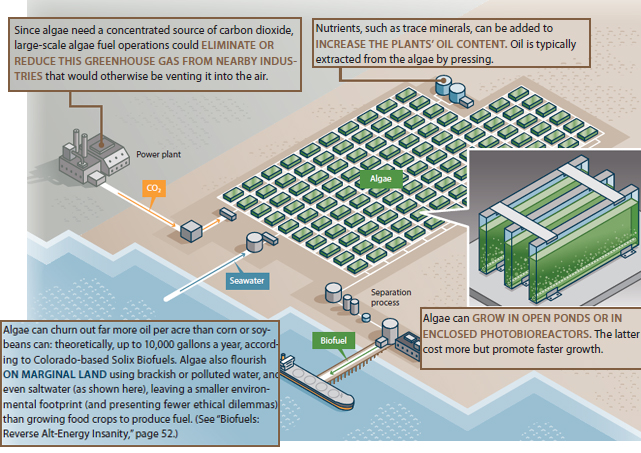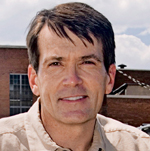sierraclub.org - sierra magazine - november/december 2009 - innovate: biofuel from pond scum


Innovate | Biofuel From Pond Scum
By Myron Levin
Microalgae, the lowly one-cell Organisms also known as pond scum, are drawing attention from researchers
and heavyweight investors in search of biofuels that won't squander fresh water or waste food supplies. They grow rapidly and produce large quantities of lipids--essentially, vegetable oil that can be turned into transportation fuels such as biodiesel, jet fuel, and ethanol. Major technological and economic barriers remain, including determining which of the 65,000 known algae species are best suited to fuel production. But major players are opening their eyes, and their wallets, to algae's potential. In July, ExxonMobil announced it would invest $600 million in algae oil development.

 Squeezing black gold from green slime may seem far-fetched, but Bryan Willson, a professor of mechanical engineering and founder of the Engines and Energy Conversion Laboratory at Colorado State University, has a nose for practical fixes. After concluding that food crops weren't a sustainable source for biofuels, he cofounded Solix Biofuels (solixbiofuels.com) with the heady goal of finding an ecofriendly substitute for fossil fuels.
Squeezing black gold from green slime may seem far-fetched, but Bryan Willson, a professor of mechanical engineering and founder of the Engines and Energy Conversion Laboratory at Colorado State University, has a nose for practical fixes. After concluding that food crops weren't a sustainable source for biofuels, he cofounded Solix Biofuels (solixbiofuels.com) with the heady goal of finding an ecofriendly substitute for fossil fuels.
In July, Solix began producing biofuels from algae at a demonstration project near Durango, Colorado, in partnership with the Southern Ute Indian tribe. Rejecting the cheaper (and land-intensive) approach of farming algae in open ponds, Solix grows the tiny, oil-dense organisms in photobioreactors--closely spaced vertical panels that maximize light exposure and increase productivity. For algae fuels to make a serious contribution, they must become competitive in price with fossil fuels. "If we're 1 percent below the cost of petroleum," says Willson, "the market is infinite."
Willson was recently named one of the Scientific American 10--the magazine's annual honor roll of visionaries who have deployed science and technology for the good of humanity. Tens of thousands of fuel-stingy, clean-burning cookstoves designed at Willson's laboratory are now being supplied to poor households in India by Envirofit International (envirofit.org), a nonprofit he cofounded in 2003.
Willson, 50, grew up in Texas and put himself through college by guiding rafting and backcountry trips. "There are innumerable cases where technology has degraded the planet," he says. "But there are many cases where technology can improve the human condition."
Infographic: Brian Kaas.
Photo: William A. Cotton/Colorado State University; used with permission